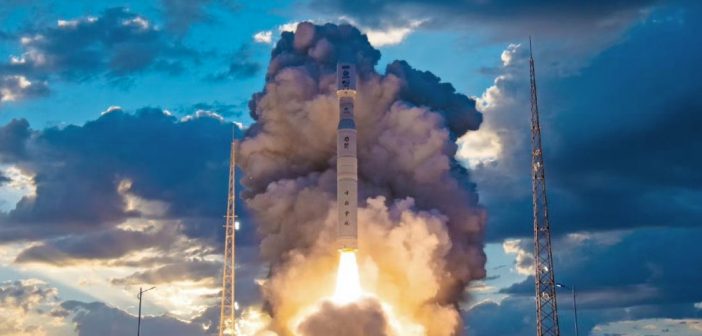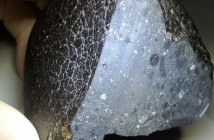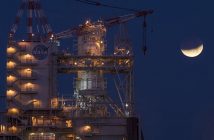
By Staff Writer
Chinese commercial space launch provider CAS Space successfully sent another five satellites into orbit yesterday, September 25, 2024. The Kinetica 1-Y4 rocket lifted off at 7:33 a.m. (local time) from the Jiuquan Satellite Launch Center in northwestern China’s Gobi Desert, making it four out of four successful launches for the rocket type. CAS Space was one of three Chinese space companies to launch rockets this week.
“Kinetica-1 Mission Y4 is officially declared a perfect success,” the company posted on its social media platforms. “The mission carries five satellites Zhongke (AIRSAT) 01/02, Jilin SAR01A, and Yunyao-21/22 into orbits with high accuracy, again exceeding the standard.”
Yunyao-1-21 and 22 are two weather satellites with GNSS payloads. JILIN-1-SAR01A is Chang Guang Satellite Technology’s first synthetic aperture radar satellite, and the AIRSAT 01 and 02 satellites are flat-panel Ku-band synthetic aperture radars.
CAS Space is owned by the Chinese Academy of Science, the world’s largest research organisation and the State Council of China’s top scientific offshoot. CAS Space has constructed its dedicated launch pad and facilities at Jiuquan. Aside from offering commercial launch services and generating revenue for the People’s Republic of China, it also takes viable concepts from the Academy and gets them onto the launchpad.
CAS Space says it plans two more launches this year and an unspecified number in 2025. The company is also touting for payload customers. “Our launch opportunities are open worldwide,” it said yesterday. “We look forward to having you onboard!”
Preceding CAS Space’s launch this week, on Tuesday, September 24, China Aerospace Science and Technology Corporation (CASC), the prime launcher for the country’s space program, put eight remote sensing satellites into sun-synchronous orbit from their floating launch vessel just off Haiyang using a Jielong-3 Y-4 carrier rocket.
Onboard were the Tianyi-41, Star Era-15, Star Era-21, Star Era-22, Yuxing-205, Fudan-1, Tianyan-15, and Jitianxing A-01 satellites. All deployed successfully.
“This mission is also the first time that Jielong-3 has carried out a sun-synchronous orbit mission near the coast of Haiyang, successfully verifying the feasibility of launching a sun-synchronous orbit at this point, and further improving the economic efficiency of commercial launch mission,” a post-launch statement from CASC subsidiary China Rocket reads.
Meanwhile, a vertical take-off and vertical landing test of the Nebula 1 rocket undertaken by the privately owned Deep Blue Aerospace on Monday, September 23, was less successful. While the majority of the 179-second test went as planned, on its descent, the rocket slowed to a hovering, the engine shut down at a not-safe height, and it landed hard. Footage shows the rocket falling over amid an explosion and coming to rest in two pieces on its side on the landing pad. Despite this, the company won some plaudits for being transparent. Deep Space is another company hoping to start offering commercial launch services.





